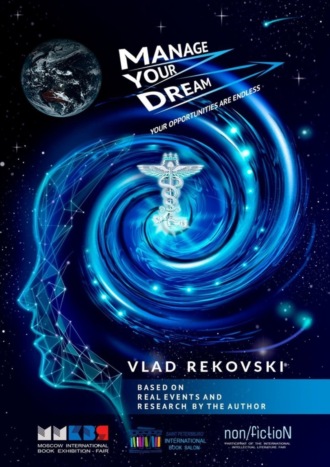
Полная версия
Manage your dream. Your opportunities are endless
Another life
And here I am enlisted in the 2nd battalion of the 31st motorized rifle regiment of the Sivash rapid deployment division. It was a hot summer. We entered the unit’s location, went up to the third floor and entered our barracks. The sight was unexpected: on one floor there were two companies, each with 120 people (4 platoons of 30 people each). There were no partitions between companies and platoons. It was one huge room with bunk beds. At that moment, I realized that it was necessary not only to survive in such conditions, but to succeed. I definitely need to stand out from the crowd and try to do more than the rest!
And here is the first formation of the company after visiting the bathhouse. All are dressed in uniforms, some of the guys look funny – those for whom the clothes did not fit. I was lucky because the clothes fit me.
After the roll call and check of the new squad, a survey began: “Who is the athlete?” I responded immediately. My name was written down. A number of other questions followed, but I waited. For example, to the question “Who plays the guitar or other instruments?” I deliberately kept silent, because already earlier, even before the conscription, I had heard from experienced people that the nights are very short for those who play the guitars.
So my new everyday life began, a new life in completely different and, at first, completely difficult conditions. During the first three months, our training program included only military, drill and physical training. The basis of military training was based on firing from an infantry fighting vehicle. The IFV-1 became legendary during the war in Afghanistan, and we used the entire base of its weapons, including the AGM (anti-tank guided missile). I tried to memorize everything that I heard and saw, and concentrated my attention as much as possible. I especially focused on targeting and combat tactics exercises, and then I did the analysis for myself.
First success
After two months, I had accumulated enough knowledge to propose my own options for conducting maneuvers, and I was noticed, despite the fact that my proposals often failed due to lack of experience. As a result, when, three months later, a special platoon of the thirty most successful for undergoing special training with subsequent appointment to senior sergeants was created in our regiment from three battalions, I was included in its composition. And the kind of young people who were gathered into this special platoon later affected my subsequent life after returning from the ranks of the armed forces.
We began to study military science with instructors who trained and trained special forces. Physical activity was easy for me – I practiced a similar experience and sports training from an early age. Combat tactics are, first of all, logical thinking and a creative approach, which I also acquired from childhood. We helped each other in any situation, we were like one family. For example, no one wanted to come to our platoon’s location – and this is a row of beds in a common company. Old-timers, or, in army slang, “old men”, had heard a lot about our brotherhood and were treated with respect.
I’ll give you one example. We are running a forced march to the famous Chebarkul training ground, which has become tactical in our time. The distance from our barracks to the landfill is fifteen kilometers. We are running in formation in full combat build, in addition, in each of the three platoon squads there is one heavy tank machine gun. It is transmitted when running from one soldier to the next one running behind. After five kilometers of running, the machine gun was already a significant additional load, which was not easy to cope with. At least for me it was a serious test! I accept the machine gun and, not having time to place it more comfortably on my right shoulder, I hear: “Give this piece of iron to me!” Sergei Stolyarov, nicknamed “Schwartz Niger”, picks up the machine gun, holding the barrel with his right hand. So we nicknamed him for the volume of the biceps – the same as that of the famous actor.
There were all sorts of other cases. For example, when at night someone replaced normal boots with leaky boots from one of ours, the boots were returned to the owner in twenty minutes. In the dining room, on the tables at which we sat, there was always a full set of food, and no one took it away from us, which we observed, and more than once, on other tables.
In the harsh winter conditions of the Urals, while at the tactical training range, we took turns warming ourselves on the armor of our infantry fighting vehicle. The nose of the car heated up from the constant operation of the engine, and when, according to the assignment, it was forbidden to kindle a fire, we were saved only by the warm armor of the bow of the BMP. We changed places at the stove at night in a tent at minus twenty-five degrees, lying on a bed of pine rags, prepared by us during the day, clutching a Kalashnikov assault rifle. All this, like many other things, we have experienced together.
The common goal helped us and united us in those conditions: not just to survive, but to live and live as best as possible for these two years in those conditions! We had no choice at that time. There was only what was. This was our general mind.
Of all “ours” I was the last to be demobilized, as I was finishing my “demobilization chord”. For three weeks already, on the instructions of the company commander, Major Syutov, I took part in the construction of the Memory Alley of Heroes. A hundred poplars were to be planted on the alley, paths were laid between them, benches were put up, and in the central part a four-meter cube welded from a metal frame was installed at a height of two meters for placing posters. This whole ensemble was supposed to show off in front of the building where our regiment was located. I would like to look today, thirty years later, at this alley…
To complete this assignment, I could take five privates and carry out work at any time of the day. Removing the time limit was one of the necessary prerequisites and a condition for the successful implementation of this “chord”, since no materials or funds were provided for this, and the task had to be completed. Where did I get the building material? – you will ask. And what do you think? And I am smiling now! This was a forced step, I could not act differently and acted against my will. Henceforth, I have never resorted to such methods of obtaining building materials and equipment or any other benefits.
1989. Return to the former life
And now the long-awaited June 1989. Two years of service have come to an end. We return to our former life, only a little different people: not the boys we were two years ago. During these two years of service, I took part in the transportation of explosive goods by trains across the territory of Russia; in the mission in Nagorno-Karabakh, when our group was transferred in the summer of 1988 to the city of Baku to maintain order and tranquility in the city; I stood at night on military guards, guarding military installations; I learned how to fire from almost any type of weapon of the ground forces and much more. I was demobilized with the rank of petty officer and with the specialty “commander of an infantry fighting vehicle – driver’s backup mechanic”.
During my service, I learned for myself twelve principles of survival and success for my whole life:
• evaluate the situation realistically. Don’t swim in illusions;
• make a decision, otherwise it is dangerous;
• act right away, otherwise it’s too late;
• don’t take risks without thinking – you will die;
• rely only on yourself, otherwise you will lose;
• a huge plus if you still have someone to rely on;
• look for your own kind;
• take an example from the strong;
• think positively even in the most unfavorable conditions:
I can do it! I will not give up!
• faith in yourself and the memory of people close to you help;
• I will always eat what I want and only healthy food;
• I will never freeze in the future.
Many years have passed since then, or rather, thirty. I still observe these rules today, only about a dozen other important rules have been added to this list, which you will learn about in the process of reading this book.
When I returned from the ranks of the armed forces, there were still two months left before study – it’s time to earn extra money and buy yourself everything you need for a new life.
But at that time, his father’s illness progressed, he was on a three-month course of treatment in Moscow, in a hospital for reserve officers and participants in hostilities. My father was not a military man, but he had good connections, which allowed him to get into this unique clinic. Due to my father’s illness, I came to the Ural Mineralogical Reserve, where my father had been working for sixteen years by that time. I began to help my mother with the housework at the Karmakkul cordon, which was located in the southernmost part of the reserve, twenty kilometers from the city of Karabash and the northern part of the city of Miass. We moved to this place when I was seven years old, before that we lived in another reserved cordon. I grew up in this forest, among the picturesque Ilmensk lakes and forested mountain ranges with incredible stone piles left after the Ice Age. It was my home and unique corner of our planet.
I was a very good fisherman and I was by spinning and much to my surprise the bite was incredible that summer! In the morning hours, from seven to nine, the pike itself was caught. I managed to pull out up to 10—12 good, large specimens of pikes, which in total was about thirty kilograms. Having loaded them into a bag and covered two kilometers on foot, I got on a bus in the village of Novaya Andreevka, which was located by the Miass River, and in half an hour I was at the collective farm market. I sold all the fish in fifteen minutes. A line of five to seven people lined up while I was preparing for the sale and laying out a simple inventory consisting of hand scales, packaging material and a certificate of fish inspection in the market laboratory.
I looked after the farm instead of my father, rode around on horseback the territory of the reserve entrusted to him for protection, accompanied by our German shepherd named Bars, and could earn a little for my needs.
Our father’s family comes from the city of Murom, its roots can be traced back to the 17th century. Our ancestral brick house with two floors for four families, and today it is four apartments, in the village of Berezovka, which is located fifty kilometers from Murom, was built in 1752.
My ancestors at that time were well-to-do peasants, they traded in the harvesting and sale of wood, forged all kinds of wares for agriculture and had a small trading store, which was located in a two-story house opposite, across the street.
The trading shop was located on the first floor, built of bricks, and the second floor of a small square served as a single-family dwelling.
Next to this house is the third house of our family: a one-storey one, built of logs by my grandfather Alexei Vasilyevich at a later time – at the end of the 18th century. My father, Yuri Alekseevich, was born there on July 7, 1936.
My brother and I had to do the housework since childhood, and the bulk of the work fell on the summer school holidays. For this reason, my brother and I never went, like other children, to summer children’s holiday camps. And we had our own camp in the forest. My brother and I spent the whole summer in a tent on the shore of the lake, two hundred meters from the cordon. The lake, up to eight hundred meters wide and two kilometers long, is located near the mountains, and the evening echo for us was one of our entertainments before going to bed.
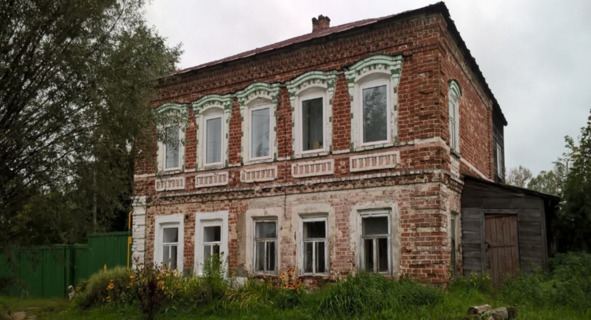
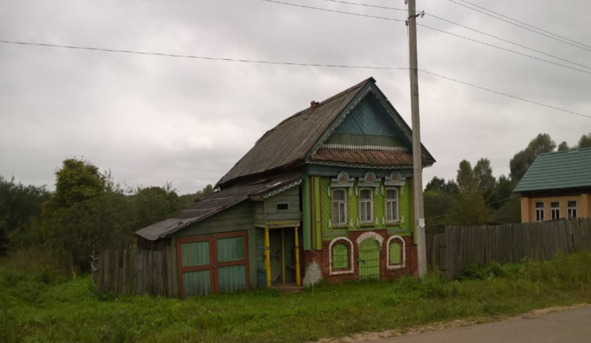
Our subsidiary farm consisted of two cows, two piglets, up to eight bulls, up to fifteen fine-wooled white sheep, about two dozen chickens, sometimes there were big black turkeys. We also had a service horse named Savras, as well as two dogs: a Siberian Laika and a German purebred shepherd named Bars. Bars, at the age of five, was shot by a resident from the nearby village of Novaya Andreevka in a shootout during the arrest of the poacher Stepan Vorsov. Vorsov shot a large elk, and if not for this shootout, he would have got off with a suspended sentence. As a result, he received five years in prison. But traces to this character led my father one more time after eight years. Vorsov ordered the murder of my father to his former cellmate. The attempt was unsuccessful thanks to the strong physique and incredible strength of Yuri Alekseevich. Despite the fact that the father was already seriously ill at that moment, he did not give up and worked as usual.
Our chores in the summer were complemented by the care of a huge potato field of sixteen acres. At least it seemed to me and my brother that way. And if not for the Colorado potato beetle, which appeared around 1979, when I was about ten years old, the hassle might have been much less. Harvesting forest berries was also time-consuming. We had to stock up on: three three-liter jars of wild strawberries and blueberries; up to ten liters of candied red viburnum; up to three buckets of lingonberries and cranberries; dried porcini mushrooms – depending on availability; about a fifty-kilogram bag of dried fish. The lake began to feed us with fish five years after our arrival. At first we lived in another cordon, Savelkul, in the very wilderness of the Ilmensk reserve, and the nearest town of Chebarkul was about thirty-five kilometers away. When I went to the first grade of school, we moved to a new place. At first, when we first arrived, there were practically no fish in the lake. It took about five years to restore fish stocks in it. Fish stocks were in poor condition because of fishing by poaching – nets and electric trails. My father and I were fishing by spinning in the summer, sometimes using nets when there was no bite at all. In the winter season, there was only one opportunity for fishing – live baits, which were installed on the ice up to ten or twelve pieces. As a result, three or four pikes could be caught per day.
Everything that I described, my brother and I knew how to do. We didn’t have much free time, as I said, so we really appreciated it and learned to use it as efficiently as possible, which I still do today, after forty years of my life.
The list of my brother and I’s tasks also included chopping birch firewood, bringing water from the river, cleaning the barnyard, watering the beds, driving livestock from pasture in the forest at the end of the day, and so on, but all this – only in the summer. When classes began at school, priorities changed, and the emphasis was on doing homework and attending sports clubs. I was fond of volleyball, skiing, was engaged in the boxing section, participated in many competitions and social life of the school, worked with a personal trainer, my father’s friend – Alexei Malolkin, the champion of Russia in karate in the 70s.
Alexey worked for several years, like my father, in the neighboring cordon. And he would still have worked, but once, as a result of a clash with violators of the protected area regime, with a group of former convicts – there were six of them – Alexey was forced to use his service weapon, a 7.62 mm carbine. As a result, a criminal case was opened against him and almost sentenced to imprisonment. This would be the end if he, despite his recognizance not to leave, had not gone to a personal meeting with the USSR Prosecutor General in Moscow. The case against Alexei was closed after this meeting in Moscow, and he was acquitted. My father helped him get an appointment in Moscow.
Meeting the right people is one of the essential prerequisites for success. Look for and keep in touch with people who can teach you something. Maintain contact with those people whom you would like to be like or have those traits that you may not have yet, but these people already have.
I will cite several examples of outstanding personalities who respected my father very much and who often visited us: Major General Karpukhin – the head of the special forces group “Alpha”, twice Hero of the Soviet Union; Viktor Petrovich Makeev – General Designer of KB Miass-20; cosmonaut Pavel Romanovich Popovich from the group that trained in the first team together with Yuri Gagarin; Corresponding Member of the Academy of Sciences, Professor, Doctor of Sciences Viktor Alekseevich Koroteev and several other very bright and famous personalities.
How did my father’s acquaintance affect me? – you ask. When I was five years old, General Karpukhin brought and presented me with a suit of a cadet of the Suvorov Military School, which was tailored for me, and I proudly put it on sometimes. I felt and imagined myself to be a very courageous and significant person. I am already at this age to the question of cosmonaut Popovich: “What do you want to become, fighter?” – Immediately and clearly answered: “I want to become a general, comrade general!” To which he smiled broadly and replied: “So, you will definitely be!”
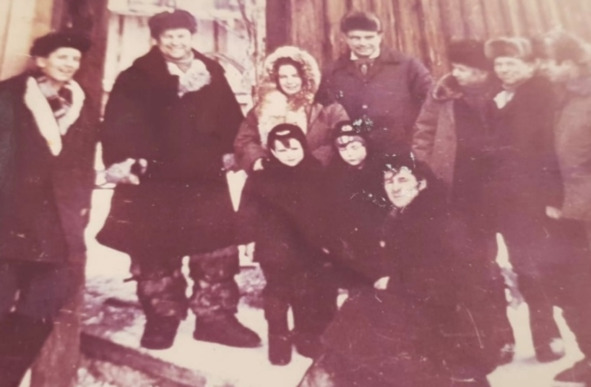
Our guest is cosmonaut Pavel Romanovich Popovich, 12/22/1975, second from the left (in the center – mother Lydia Aleksandrovna, in front of the left – brother Dmitry, I am on the right, next to me is father Yuri Alekseevich)
From the words of my father – the story of cosmonaut Pavel Romanovich Popovich:
“In 1959, by a resolution of the Central Committee of the CPSU and the Council of Ministers of the USSR, a decision was made on the selection and preparation of cosmonauts for the first flight on the “East” spacecraft. They chose from fighter pilots because they are the most trained and have the characteristics suitable for this. The selection was very tough, both according to medical criteria and physical data: the candidate must not be older than 35 years old, height no more than 175 cm, and weight up to 75 kg. At the time of selection, we did not have any information for what purpose we were selected. For us, the military, it was a common thing.
For the initial interview, 347 people were selected out of 3,400 candidates, but of them only 29 military pilots were able to complete all stages of the medical examination.
The first cosmonaut corps was formed on March 7, 1960, 12 people were enrolled in it. Only after that, it was announced to us for what purposes our detachment was formed. We became the first participants in the program, which was named the “East” Program. Yura Gagarin flew first on the “East-1” spacecraft, and my finest hour came a year later: in August 1962, I flew into space on the “East-4” spacecraft. This was the first program of two manned spacecraft. Andrei Nikolaev then flew the second ship – “East-3”. In this flight, we conducted the first experiments on radio communication between the crews of two ships in space. In addition, I could control the “East-4” spacecraft using the first manual control system”.
My father once asked Pavel Romanovich about the conditions for staying on a spacecraft, to which the cosmonaut replied, thinking a little: “Yura, conditions are not for normal life in this piece of iron! There was room for me alone a little more than one and a half cubic meters, one armchair in the center, from which it is not even possible to stand up at full height…”
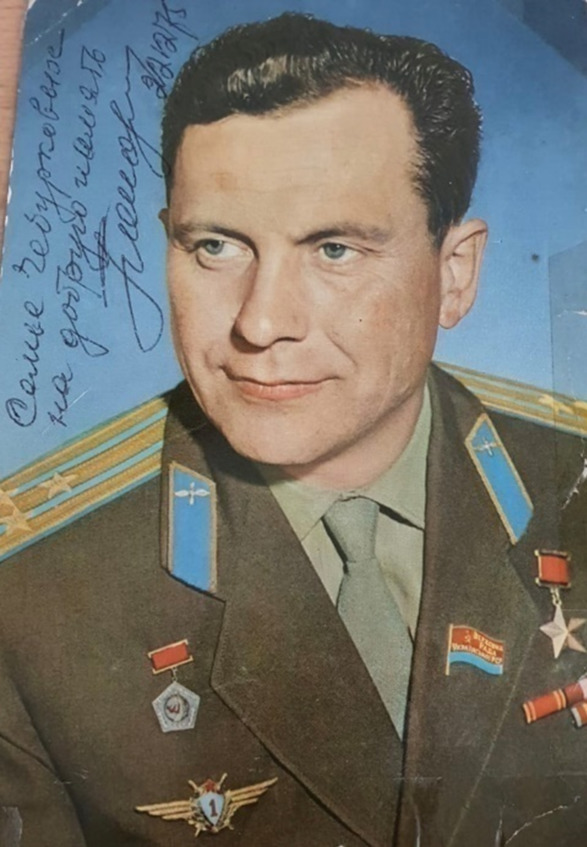
Cosmonaut Pavel Romanovich Popovich, 12/22/1975
One spring, when I was six years old, I was running on the ice of Lake Savelkul, holding on to the frame of the baby carriage, which I was rolling in front of me. Suddenly, the ice fell under my feet, and I found myself in the water. Fortunately for me, the wheels of the baby carriage did not fall under the ice, but caught on the edge of the ice. I continued to hold on tightly to the frame of the stroller, realizing that if I let go of my hands, I would fall under the ice. I screamed, because my mother was about three hundred meters away from me on the ice – fishing with a winter rod. She was a great lover of winter fishing, and in summer she almost never fished – I believe that with our farm in the summer there was simply no time for this. I shouted until Mommy ran up and, grabbing my jacket, pulled me out of the water. After this incident, I did not become afraid of water and did not stop going on the ice. I only became more circumspect, especially in spring, and I avoided those places where the snow had a yellowish tint.
My father taught me a lot, including how to set goals and how to deal with difficulties. “Self-hypnosis is a great force”, he repeated in a difficult situation. He himself did not smoke or drink alcohol. I have never seen my father tipsy, distressed, demotivated, sad or confused. He often told me: “Smile more often! Do not be afraid of difficulties, but overcome them. Look for a way out of any situation and do not give up in front of an obstacle. If you started a business, then be sure to bring it to the end! Only then can you start another business. Set goals and go to them as the ship makes its way under the guidance of the captain. And your life will be bright, although not always easy. But you will get what you want”. I remember his parting words very well today.
How could a person with an eighth grade education know this? – I asked myself more than once. And here is my answer today: he learned all this through communication with people. I will write more about this important factor later.
Despite a serious and incurable illness, my father lived fully for another twenty-two years and passed away on Easter in Germany at the age of eighty, only two months before his eighty-first birthday. Not long before that, I visited him, having arrived from Russia for a couple of days in Germany, in the city of Goslar. The last six months have been quite a difficult time, especially for my mother, who was always by his side. I put my arms around my father’s shoulders before leaving, stayed in this position for a while and realized that I was seeing him for the last time. My father passed away a week after my departure, in April 2017. I am very grateful to him for the fact that he was able to convey to me everything that I use today in my difficult, but very dynamic and diverse life!
1989 year. Sverdlovsk. I am 20 years old
So, I am returning to the city of Sverdlovsk, now Yekaterinburg, in the fall of 1989. I meet with my friend Sergei Stepnoy, with whom we served together in the same battalion of the Sivash division from the very first to the last day, and we start doing business. Also my former classmates and friends Vasily Chudny and Vladimir Furmanov returned after the service. Vasily and I ended up in Chebarkul together, but six months later he was assigned to eastern Germany, near Magdeburg. Vladimir was drafted a year later and ended up in a construction battalion, where he also had to go through difficult times … We recovered for the second year of the Faculty of Economics and continued our studies. Student Valery Lepninsky joined the three of us on a new course. I realized over time that this was a very successful and active union for the embodiment of our ideas and true friendship.
Today Valery is the owner of the large corporation “Our time”, formerly “Ural machines” LLC. Vladimir Furmanov is the general director of a pasta company known to everyone in Russia. Vasily Chudny, unfortunately, tragically passed away back in 1999, but his departure to another world was not associated with his professional activities.
We returned from the army two years later as other people, respectively, our interests and goals also became other. We began to think about how we can become free. Yes, that’s right: we wanted to be free! To be free from stereotypes of life, not to depend on circumstances and from other people, to have the right to choose for ourselves and make decisions independently! We wanted to be ourselves: to be individuals, entrepreneurial and successful!

